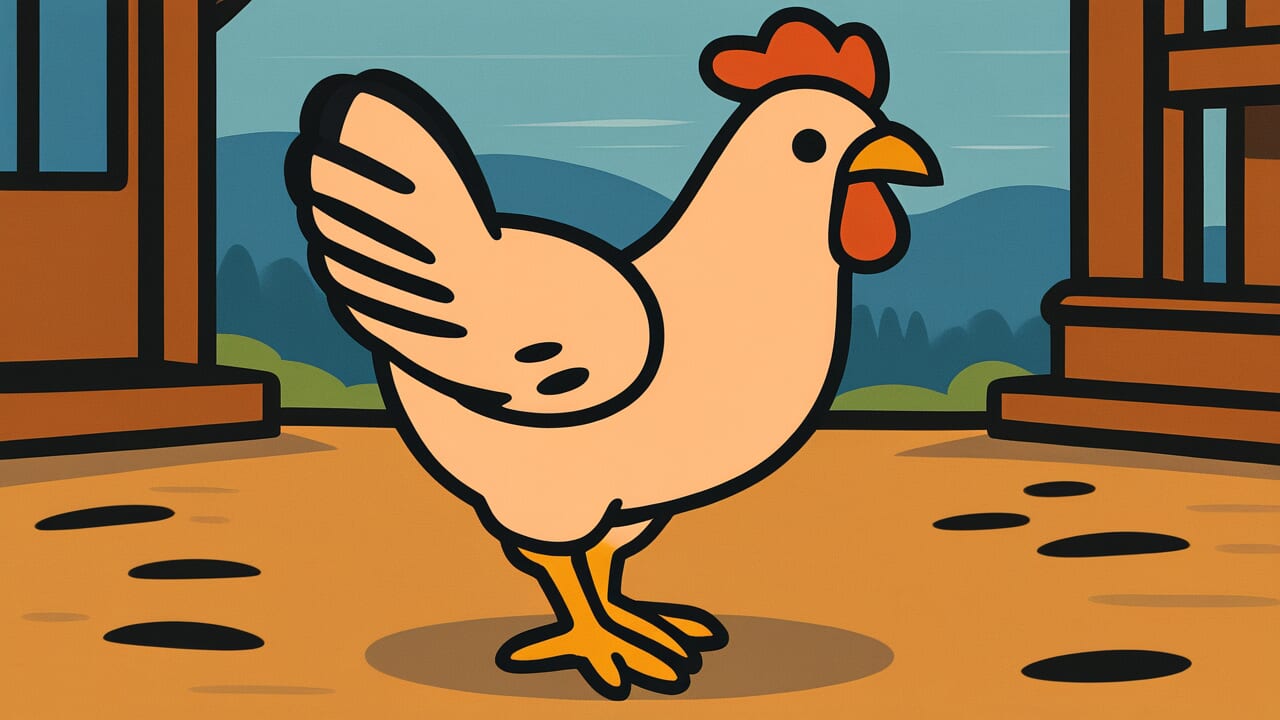How to Read “Even if a chicken struggles, it’s still barefoot”
Jitabata shitemo niwatori wa hadashi
Meaning of “Even if a chicken struggles, it’s still barefoot”
This proverb teaches that making a fuss won’t change reality. It means there’s no point in panicking or making noise about things that have already happened or facts that cannot be changed.
Just as chickens are naturally barefoot, some realities simply cannot be changed. The proverb teaches that instead of resisting uselessly in such situations, we should accept reality and think about our next action.
People use this saying when someone panics after making an irreversible mistake. It’s also used when someone keeps complaining about a result that’s already been decided.
By saying “Even if a chicken struggles, it’s still barefoot,” you encourage someone to stop resisting uselessly and calm down. Even today, people understand this as an effective expression for pointing out how useless it is to make an emotional fuss.
Origin and Etymology
No clear written records explain the origin of this proverb. However, we can make interesting observations from how the phrase is constructed.
“Jitabata” is a mimetic word unique to Japanese. It describes the way someone flails their arms and legs in panic.
The phrase “a chicken is barefoot” refers to a biological characteristic of chickens. Chickens are creatures that live barefoot by nature. No matter how much they flap their feet, they cannot wear shoes. This is an unchangeable fact.
This expression likely came from observing chickens in farming villages. Farmers saw chickens scratching the ground for food or flapping when startled every day.
No matter how violently chickens moved around, their feet remained bare. People probably saw their own useless resistance reflected in this image.
The phrase contrasts the dynamic “jitabata” with the static fact of being “barefoot.” This contrast vividly expresses the gap between effort and reality.
This clever contrast may be why the proverb resonated with people and has been passed down through generations.
Usage Examples
- Even if a chicken struggles, it’s still barefoot, so let’s prepare for next time instead of making a fuss after checking answers when the test is over
- Complaining after signing the contract is pointless—even if a chicken struggles, it’s still barefoot
Universal Wisdom
This proverb has been passed down because it addresses a fundamental human impulse. When we face unwanted reality, we naturally want to resist.
We want to make an emotional fuss, blame someone, and deny the situation. This is a natural human reaction.
However, our ancestors understood that such emotional reactions fundamentally change nothing. They chose chickens as an example to communicate this truth clearly.
Just as chickens remain barefoot no matter how much they flap their feet, unchangeable facts cannot be changed. We often forget this simple, clear truth.
Human psychology resists accepting reality. The more inconvenient the reality is for us, the stronger this resistance becomes.
We hold a faint hope that making a fuss might change something. Or we find psychological satisfaction in at least expressing our dissatisfaction.
But such behavior only drains our energy without moving us forward.
This proverb teaches the importance of balancing emotion and reason. Everyone has the right to become emotional.
But staying in that state forever prevents us from taking the next step. The courage to accept reality is what gives us the power to move our lives forward.
When AI Hears This
Viewing a chicken’s bare feet as a “defect” is a human perspective. From an evolutionary biology standpoint, it’s actually the result of sophisticated optimization.
The ancestors of birds were theropod dinosaurs. They needed to dramatically reduce their body weight to acquire flight ability. Modern chickens lack shoe-like protective layers on their feet precisely because of this “weight reduction strategy.”
What’s interesting is that chickens gained different abilities in exchange for the protection they lost by thinning their foot skin. Their bare soles have densely packed sensory receptors that can detect minute vibrations in the ground.
This functions as an early warning system to quickly sense approaching predators. The choice “not to wear shoes” was a trade-off that gained information-gathering ability in exchange for defensive power.
Chicken feet also have scale-like keratin layers. This is a compromise solution that maintains protective function with minimal weight while preserving a legacy from the reptile era.
Evolution doesn’t aim for perfection. It searches for “good enough solutions” within constraints.
The “unchangeable essence” this proverb shows might actually be the optimal solution that the environment selected over hundreds of millions of years. What looks like a defect from the outside may be a characteristic essential for survival for those involved.
This paradox is the essence of evolution.
Lessons for Today
This proverb teaches modern people important life skills: emotional control and choosing actions. This teaching holds even more value in an age when we can react instantly on social media.
When something unwanted happens, we want to react immediately. We express dissatisfaction, blame someone, and lament the situation.
But what if we directed that time and energy toward things we can actually change? Learning from failure, preparing for next time, exploring new possibilities—these are far more constructive.
The key is not to deny emotions. Feeling frustrated or sad is natural. But instead of being controlled by those emotions and continuing useless resistance, take a deep breath and face reality.
Then ask yourself, “What can I do right now?” Whether you can make this shift greatly affects your quality of life.
If you’re facing unchangeable reality, have the courage to accept it. That courage becomes the power to take your next step.
Don’t be bound by the past. Start walking toward the future.



Comments